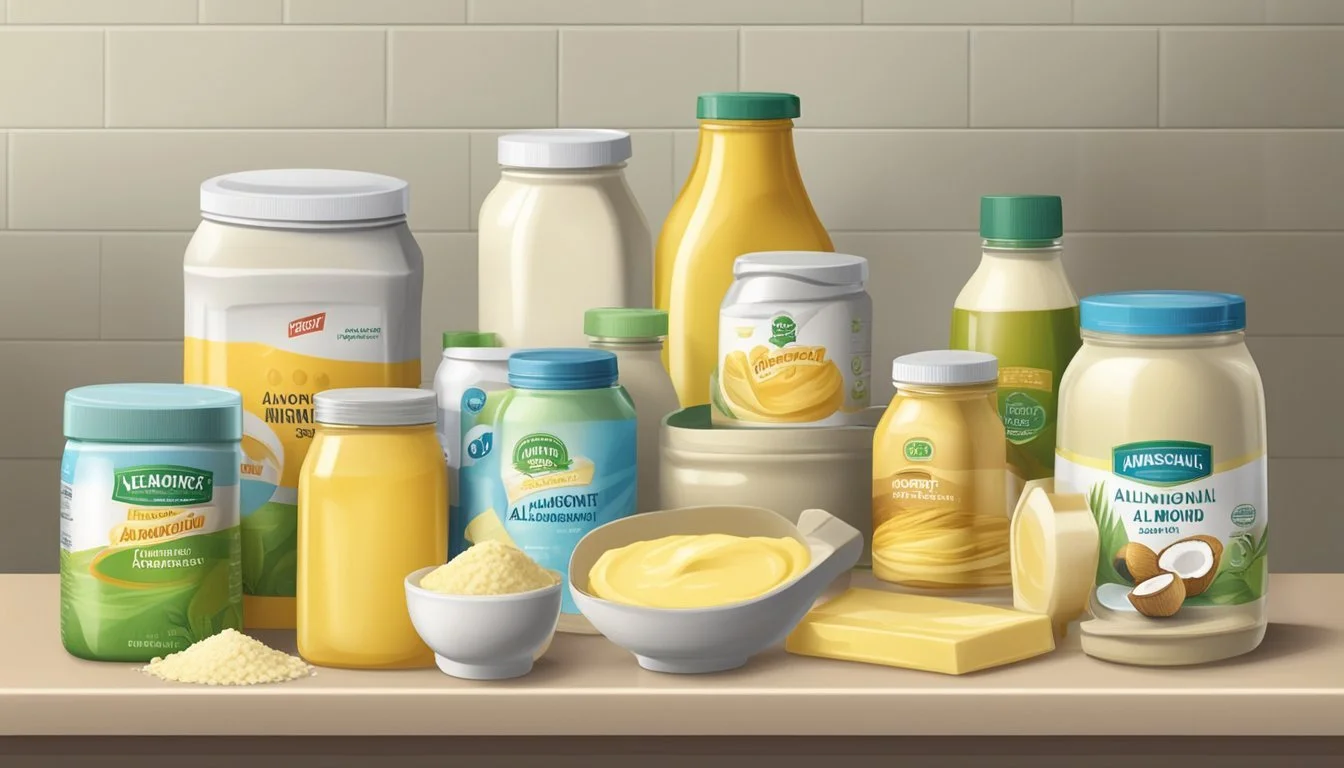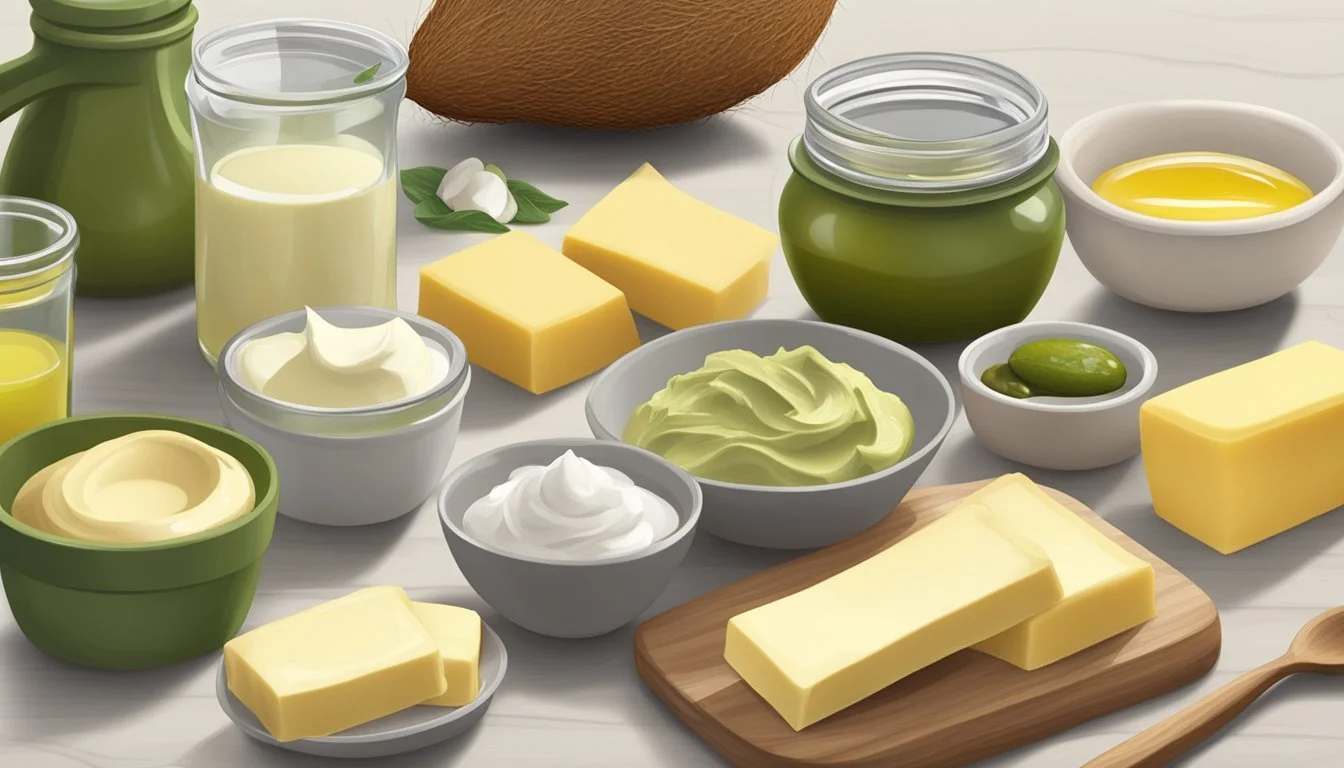Margarine Substitutes
Top Healthy Alternatives for Your Recipes
Margarine has long been a staple in kitchens for its versatility in baking, cooking, and as a spread. However, with rising health consciousness and dietary preferences, individuals often seek margarine substitutes that offer a healthier profile or cater to specific dietary needs. These alternatives not only aim to replicate the functional properties of margarine, such as its texture and melting characteristics but also provide a range of flavors and nutritional benefits.
The market now presents a plethora of margarine substitutes that can seamlessly fit into various recipes. For those looking to lower their intake of trans fats or accommodate dairy-free diets, alternatives like olive oil, coconut oil, and nut butters offer a substantial nutritional profile rich in unsaturated fats. Meanwhile, for bakers wanting to maintain the integrity of their sweet treats, unsweetened applesauce serves as a low-fat option that keeps baked goods moist without altering their flavor profile. Each substitute brings its own set of advantages, catering to different culinary needs and personal preferences.
Choosing the correct margarine substitute can depend on the desired outcome of the recipe. When a rich, creamy texture is sought after, options like cream cheese or tofu can be favorable. Alternatively, for those aiming to keep calories in check, lighter alternatives such as pureed fruits or yogurt can produce satisfactory results without the added fat. It's about finding the right balance between health considerations and culinary expectations while ensuring the end product remains delicious.
Understanding Margarine
Margarine is a popular butter substitute, widely used in various culinary applications, whose health implications and cooking properties are worth considering.
Composition and Health Aspects
Margarine is typically made from vegetable oils that have undergone a process called hydrogenation. This involves the conversion of these oils into a solid form, making margarine spreadable at room temperature. Hydrogenation increases the presence of trans fats, which have been associated with higher levels of LDL cholesterol (the "bad" cholesterol) and a potential increase in heart disease risk.
Health-wise, margarine can vary greatly. Some types are high in unsaturated fats, which are considered beneficial, while others are high in saturated fats and trans fats. It's important for consumers to carefully read the labels and choose margarines that are trans fat-free and low in saturated fat to promote better cholesterol levels.
Margarine in Cooking and Baking
In cooking and baking, margarine serves as an alternative to butter, providing a similar texture and fat content, which is important for the structure of baked goods. Its performance in recipes depends on its fat composition, which affects the moisture, tenderness, and browning of the final product.
When used in baking:
Margarine with a higher fat content (usually around 80% fat) can be directly substituted for butter.
Lower-fat margarines might result in less desirable outcomes due to their higher water content.
In cooking:
Margarine melts and spreads similarly to butter and can be used for sautéing and pan-frying.
However, one should be cautious at high temperatures since some margarines can burn faster than butter due to their lower smoke points.
Types of Margarine Substitutes
When seeking alternatives to margarine, one can choose from a variety of plant-based oils, dairy options, and fruit, vegetable, or nut-derived products. Each substitute offers distinct features and can be selected based on dietary preferences or desired outcomes in cooking and baking.
Plant-Based Oils
Plant-based oils stand out as versatile margarine substitutes suitable for various dishes. The most common oils include:
Olive oil: Excellent for savory dishes, providing a rich flavor.
Coconut oil: Can solidify like margarine, ideal for baked goods and provides a neutral taste when refined.
Avocado oil: High in monounsaturated fats, perfect for health-conscious cooking.
Vegetable oil: A standard substitute, easily accessible and multifunctional.
Butter and Other Dairy Alternatives
Butter serves as a natural and flavorful margarine substitute, especially in baking. For those who prefer dairy yet seek alternatives with potentially lower calories or different fat compositions, the following options can be considered:
Softened cream cheese: When softened, it blends well in recipes.
Reduced-fat cream cheese: Offers fewer calories and fats, suitable for health-oriented diets.
Vegetable oil spreads (60% to 70%): These are trans-fat-free alternatives that mimic the texture of margarine.
Fruit and Vegetable Purees
Purees made from fruits and vegetables provide moisture to baked goods and can enhance nutritional content. Notable purees include:
Applesauce: A common substitute, often used unsweetened to preserve the original flavors of recipes and provides health benefits.
Mashed bananas: Impart a unique flavor along with moisture and binding qualities.
Avocado: Offers richness and creaminess, with the added benefits of healthy fats.
Nut and Seed Butters
Nut and seed butters are flavor-rich options that contribute protein to various dishes. Some highly-recommended nut butters include:
Almond butter: A dairy-free alternative that blends well in many recipes.
Peanut butter: Works well in cookies and some savory sauces.
Seed butters (such as sunflower or tahini): Offer distinctive tastes; suitable for people with nut allergies.
Nutritional Considerations
Choosing a margarine substitute can lead to more healthful eating habits. It allows individuals to incorporate ingredients with better nutritional profiles and focus on fats that may benefit heart health.
Health Benefits of Alternatives
Substitutes for margarine often come with an array of health benefits. For starters, ingredients like olive oil and avocado oil are high in monounsaturated fats, which have been linked to reduced risk of heart disease. These oils provide antioxidants, which are compounds known to protect cells from damage. Coconut oil, while higher in saturated fat, is a plant-based source of fat and should be used sparingly.
On the other hand, fruit-based spreads such as applesauce and mashed bananas offer dietary fiber, vitamins, and can contribute to a lower overall caloric intake when used in place of margarine. Additionally, nut butters contribute not only heart-healthy fats but also protein, making them a nutritious alternative to margarine.
Understanding Fats and Oils
When examining the nutritional content of margarine alternatives, it's crucial to understand the types of fats and how they affect health. Saturated fats, typically found in higher amounts in animal products and some plant oils like coconut oil, can raise levels of bad cholesterol in the blood. In contrast, monounsaturated and polyunsaturated fats are considered more healthful. They can improve blood cholesterol levels, thereby reducing the risk of heart disease.
Table of Fat Composition in Common Margarine Substitutes:
Ingredient Saturated Fats Monounsaturated Fats Polyunsaturated Fats Notable Nutrients Olive Oil Low High Moderate Antioxidants, Vitamins E/K Coconut Oil High Low Low MCTs* Avocado Oil Low High Moderate Vitamin E, Folate Applesauce Negligible Negligible Negligible Fiber, Vitamin C Nut Butters Moderate High Moderate Protein, Fiber
*MCTs: Medium Chain Triglycerides
It's important for consumers to choose alternatives that align with their dietary needs, keeping in mind the balance between flavor, nutritional content, and calorie density. For example, while olive oil is calorie-dense, it is also nutrient-rich, providing essential vitamins and antioxidants that can contribute to a healthy diet.
Practical Applications
Selecting the right margarine substitute can affect the flavor, texture, and outcome of a recipe. Knowledge of how each alternative behaves in cooking or baking is essential for successful results.
Cooking Tips with Substitutes
When substituting margarine in savory dishes, flavor is key. Olive oil is ideal for sautéing and roasting, imparting a fruity, rich taste. For a light texture in salad dressings or sauces, one might use vegetable oils like sunflower or canola. The ratio for substitution generally follows a 3:4 ratio, meaning for every cup of margarine, one can use 3/4 cup of oil.
Smoke point also matters when cooking. High heat cooking requires an oil with a high smoke point, such as avocado oil, to prevent burning and off-flavors. Conversely, for medium-heat cooking, olive oil fits the bill perfectly, it not only maintains its flavor but also its nutritive properties.
Baking Guides and Ratios
Baking calls for precision, especially with substitutions. Applesauce can replace margarine to add natural sweetness and moisture, enhancing the result of muffins and cakes. The recommended replacement is a 1:1 ratio, but unsweetened varieties are preferable to avoid altering the intended taste of the recipe.
For a protein-rich replacement, nut butters are excellent in cookies and bars. They contribute a distinct flavor and dense texture, so adjustments may be needed to achieve the desired outcome. Here, the substitution ratio can be trickier and may require a bit of experimentation to perfect.
In breads or doughs where margarine typically provides structure, solid fats like coconut oil can be utilized. Measure coconut oil in its solid state to maintain the texture that margarine would provide, using a 1:1 substitution ratio.
A solid grasp of these alternatives and their respective ratios empowers one to adapt recipes confidently, achieving both desired taste and texture.
Specialized Margarine Substitutes
When it comes to baking and cooking, finding the right margarine substitute can be vital, especially for those on vegan, special diets, or looking for healthier options. This section explores tailored alternatives to margarine suitable for dietary needs and preferences.
For Vegan and Special Diets
Vegan Diet Alternatives:
Coconut Oil: Solid at room temperature and can mimic margarine in baking.
Nut Butters: Such as peanut, almond, and walnut, offering dense, flavorful fats.
Unsweetened Applesauce: A moist, fat-free alternative for some recipes, though flavor and texture will differ.
Tofu: Silken tofu, when blended, can provide a creamy texture in baked goods.
Special Dietary Needs:
Reduced-Fat Cream Cheese: For those not strictly vegan, a lower-fat option that maintains richness.
Margarine substitutes should be selected: based on the desired final texture and flavor of the dish.
Low-Fat and Reduced-Calorie Options
Healthy alternatives can help reduce the overall fat and calorie content of recipes.
Low-Fat Alternatives:
Avocado: Use mashed avocado for its healthy fats and creamy consistency.
Greek Yogurt: A tangy replacement that adds protein while reducing fat content.
Reduced-Calorie Replacements:
Unsweetened Applesauce: Replaces fat with fruit-based moisture, lessening calorie count.
Buttermilk: Offers tanginess and tenderness to baked goods with fewer calories than margarine.
Choosing the right substitute involves considering the alternative's impact on flavor, texture, and caloric content relative to margarine.
Common Substitutes Overview
Selecting the right margarine substitute can enhance the nutritional value and taste of various dishes. This section provides an overview of the common substitutes for margarine and their best applications in cooking and baking.
Substitutes for Various Dishes
When it comes to finding margarine substitutes for various dishes, the key is to identify the purpose that margarine serves in the original recipe. Here are some specific alternatives based on the dish type:
Baking: Unsweetened apple sauce can provide moisture without adding excess sugar, while mashed bananas contribute moisture and a natural sweetness along with the benefit of added potassium.
Cooking: Oils such as canola and olive oil offer a healthy fat content and can perform well in sautéing and other cooking applications.
Spreads: Substitutes like ricotta cheese or ghee can serve as spreads offering distinct flavor profiles and textures.
Best Margarine Substitutes
For those searching for the best overall margarine substitutes, consider the following options:
Butter: Known for its rich flavor and perfect for baking.
Ghee: Clarified butter that provides a nutty taste and high smoke point, suitable for high-temperature cooking.
Coconut Oil: Especially useful in vegan baking, it is a dairy-free option that stands out for its distinct flavor and creamy texture.
Yogurt or Buttermilk: These can be used in baking to impart tenderness and a slight tang.
Lard: A traditional fat with a neutral flavor, ideal for pie crusts and pastries.
Each of these alternatives can replace margarine in a 1:1 ratio, although minor adjustments may be needed for liquid oils or for substitutes like yogurt to achieve the desired consistency.
Safety and Storage
When considering safety and storage for margarine substitutes, one should pay close attention to proper handling and the preservation method to ensure longevity and prevent spoilage. Substitutes vary in their storage needs and shelf life, with factors like salt content and burning point affecting their durability.
Proper Handling and Preservation
Margarine substitutes should be stored in cool, dry places, away from direct sunlight to maintain their quality and freshness. Containers must be airtight to prevent oxidation, which can degrade natural ingredients and alter flavor. For substitutes with a higher percentage of unsaturated fats, like certain oils, refrigeration might be necessary to extend freshness due to their lower burning points. It's particularly important to keep these substitutes away from sources of heat to avoid reaching the burning point, which not only affects taste but could also pose a safety concern.
Shelf Life of Substitutes
The shelf life of margarine substitutes can be influenced by several factors:
Salt and sodium content: Preservatives like salt can extend shelf life.
Natural ingredients: Products with higher natural content may have a shorter shelf life.
Type of substitute:
Oils (olive, coconut, avocado): Usually last for several months when stored correctly.
Fruit-based options (applesauce, mashed bananas): Should be consumed relatively quickly and stored in the refrigerator.
Nut butters: Can last for months if kept sealed in a cool place.
Dairy alternatives (cream cheese): Require refrigeration and typically have a shelf life between several weeks to a couple of months, depending on the presence of preservatives.
By adhering to these storage guidelines, one can ensure the safety and optimal condition of their margarine substitutes.
FAQs in Margarine Substitution
When exploring margarine substitutes, it's essential to consider both the functional role of margarine in recipes and the health implications of the alternatives. These frequently asked questions highlight suitable replacements and their health impacts.
Choosing the Right Substitute
What are some alternatives to margarine in baking and cooking?
Alternatives include:
Butter: A traditional option that offers rich flavor.
Applesauce: Ideal for reducing fat; best used in sweet baked goods.
Vegetable or Olive Oil Spreads: Often lower in saturated fats and free from trans fats.
Nut Butters (e.g., Almond, Peanut): Add distinctive flavors plus fatty density to baked goods.
Avocado: Provides healthy fats and a creamy texture.
Which substitutes work best for maintaining the original taste and texture?
Butter and vegetable oil spreads closely mimic margarine's properties, making them versatile for various recipes. Nut butters work well where a nutty flavor is complementary.
Health Concerns and Alternatives
How do margarine substitutes impact cholesterol, specifically LDL levels?
Butter has saturated fats that can raise LDL cholesterol levels.
Plant-based spreads and oils generally have a neutral or potentially beneficial effect on LDL.
What alternatives should be considered for a healthy choice without artificial additives?
Healthy options without artificial additives are:
Olive oil or other plant-based oil spreads that don't contain partially hydrogenated oils.
Nut butters if they're natural and without added sugars or salts.
Do any margarine substitutes have positive health benefits?
Yes, some substitutes can contribute to health benefits:
Avocado is rich in monounsaturated fats which can help with inflammation.
Nut butters provide magnesium and fibers.
What about animal products and inflammation concerns?
Some individuals seek alternatives due to concerns about animal products and inflammation:
Plant-based oils and nut butters are devoid of animal products and are often anti-inflammatory.
Eggs, used in some baked goods as a binder or leavening agent, can replace margarine, though they are an animal product.





